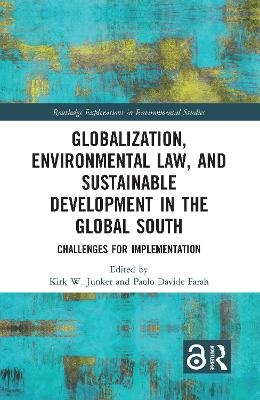
Globalization, Environmental Law, and Sustainable Development in the Global South
Routledge (Verlag)
978-0-367-74913-2 (ISBN)
Comprising contributions from lawyers from the Global South or who have experience in the Global South, this volume is organized into three parts, with a thematic inquiry woven through every chapter to ask how law can enable economies that can be sustained, given the limited carrying capacity of the earth. Part I describes and characterizes the status quo of environmental and economic problems in the Global South during the process of globalization. Some of those problems include redistribution of environmental burden on the public through over-reliance on the state in emerging economies and the transition to public-private partnerships, as well as extreme uncontrolled economic expansion. Building on Part I, Part II takes an international perspective by presenting some tools that are in place during the process of globalization that lead to friction and interfaces between developed and developing economies in environmental law. Recognizing the impossibility of a globalized Northern economy, the authors in Part III present some alternatives through framework ideas of human and civil rights, environmental rights, and indigenous persons’ rights, as well as concrete and specific legal tools to strengthen justice and rule of law institutions. The book gives new perspectives to familiar approaches through concrete examples by professional practitioners and theoretical discourse by academic researchers, and can thereby form the basis for changes in practices, as well as further discussions and comparisons.
This book will be of great interest to students and scholars of environmental law, sustainable development, and globalization and international relations, as well as legal professionals and practitioners.
Kirk W. Junker is a University Professor of Law, Director of the Environmental Law Center, Board Chair of the International Master of Environmental Science Program, and Principal Investigator at the Global South Studies Centre at the University of Cologne, Germany. He is the editor of Environmental Law Across Cultures: Comparisons for Legal Practice (Routledge, 2020). Paolo Davide Farah is a tenured Associate Professor in the Eberly College of Arts & Sciences, John D. Rockefeller IV School of Policy and Politics at West Virginia University, U.S.A. He is Founder, President, and Director of gLAWcal—Global Law Initiatives for Sustainable Development, U.K. He is the editor of China’s Influence of Non-Trade Concerns in International Economic Law (Routledge, 2016).
Introduction; PART I The environment in the Global South during the globalization of "sustainable development" 1 Managing environmental risks in privately financed infrastructure projects in Nigeria; 2 The curse of best practices: impact assessment in the context of the governance of extractives in Mongolia; 3 Extra-territorial litigation remedies: a case study of the East African Crude Oil Pipeline in Uganda; PART II Interfaces between developed and developing countries in environmental law 4 Sustainable development through environmental federalism in the case of Ethiopia; 5 Diversification of mono-economies: how legislation manages the environmental impact of foreign investments in Nigeria; 6 Transformation of sustainable development goals in regional international organizations: vertical effects, contested indicators, and interlinkages for the formation of environmental law; 7 The implementation of the Paris agreement through tax law: examples from South Africa, India, China, and Brazil; PART III Alternatives to globalization in environmental law 8 The contracting state’s role in the energy community to build the European Union’s envisioned sustainable future; 9 Global environmental governance: a necessary pathway for sustainable development of Caribbean Small Island Developing States; 10 Going beyond the law: the potential and limits of public participation in the context of sustainable development; 11 Environmental hazards and human rights violations: the case of Presídio Central Prison in Brazil; Conclusions: indicator species and the future of environmental law
| Erscheinungsdatum | 01.12.2021 |
|---|---|
| Reihe/Serie | Routledge Explorations in Environmental Studies |
| Zusatzinfo | 5 Tables, black and white; 3 Halftones, black and white; 3 Illustrations, black and white |
| Verlagsort | London |
| Sprache | englisch |
| Maße | 156 x 234 mm |
| Gewicht | 453 g |
| Themenwelt | Recht / Steuern ► Allgemeines / Lexika |
| Recht / Steuern ► EU / Internationales Recht | |
| Recht / Steuern ► Öffentliches Recht ► Umweltrecht | |
| Sozialwissenschaften ► Politik / Verwaltung | |
| Sozialwissenschaften ► Soziologie ► Spezielle Soziologien | |
| Technik ► Umwelttechnik / Biotechnologie | |
| ISBN-10 | 0-367-74913-0 / 0367749130 |
| ISBN-13 | 978-0-367-74913-2 / 9780367749132 |
| Zustand | Neuware |
| Informationen gemäß Produktsicherheitsverordnung (GPSR) | |
| Haben Sie eine Frage zum Produkt? |
aus dem Bereich


